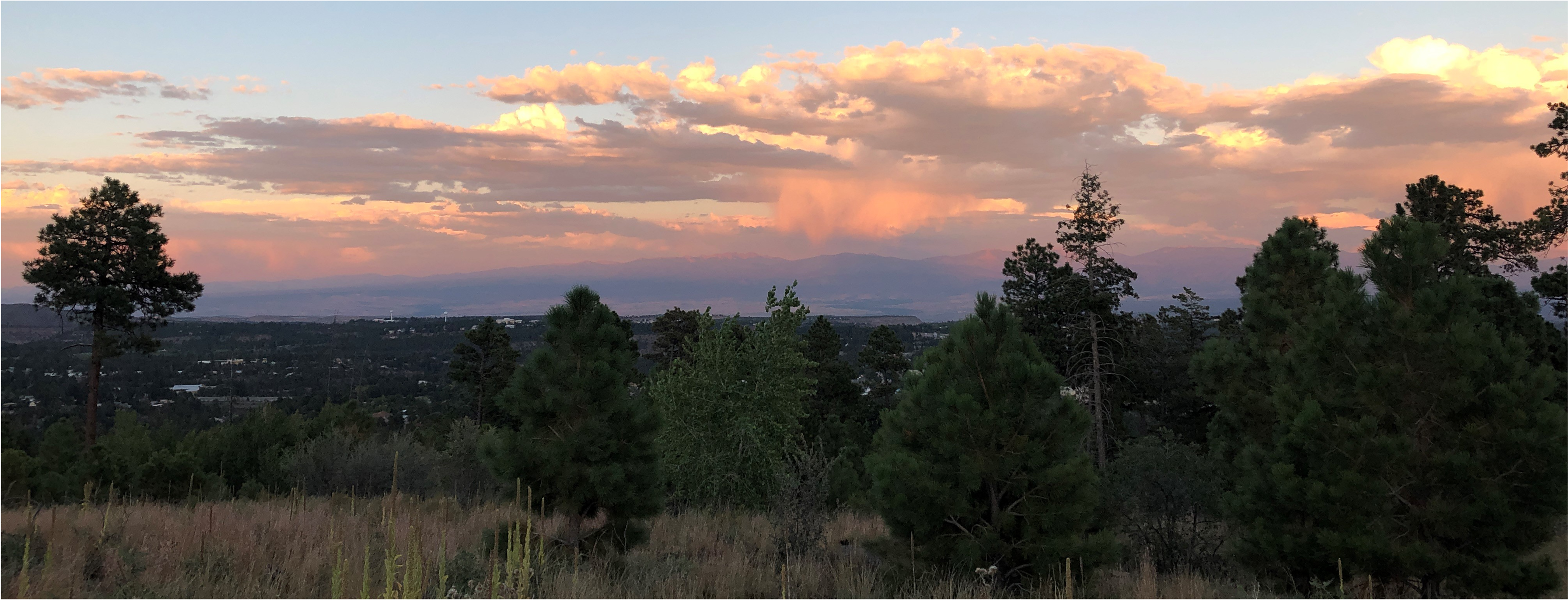Microbial and Biome Sciences Group
Contact Us
- Division Point-of-Contact

New Mexico's stunning environment is a constant reminder of the importance of protecting our climate and creating clean energy systems.
We can enable energy and environmental security by understanding and improving carbon balance
The Microbial and Biome Sciences Group (B-IOME) aims to enable energy, environmental, and food security through the research and development of natural and engineered biological systems." B-IOME scientists explore the use of algae and other microorganisms as robust platforms for making cost-effective biofuels and bioproducts, supported by established capabilities in non-model microbe development, synthetic biology, and high-throughput screening. Our researchers also study the effects of microbes on biogeochemical cycling (e.g., carbon and nitrogen), plant productivity, and plant resilience—including microbial response to disturbance (e.g., wildfire)—by harnessing 'omics, microbial ecology, and laboratory ecosystems. Finally, B-IOME scientists use computational, analysis, and protein engineering capabilities to develop tools for degrading plastic waste and for identifying place-based renewable carbon and decarbonization solutions.
Microbes and plants are everywhere and play critical roles in elemental flux in the atmosphere and on Earth (carbon, nitrogen, phosphorus, etc). These organisms influence climate, ecosystems, and agriculture as well as human, animal, and crop health.
B-IOME scientists are advancing knowledge of microbes and plants and creating climate solutions through their work on:
- Soil carbon cycling
- Nutrient/drought management
- Growth promoting molecules and microorganisms
- Terrestrial ecology
- Algae biology
For many years, scientists at Los Alamos have been investigating the role of soil microorganisms in carbon cycling and carbon management, as well as the rhizosphere microbial interactions that influence plant resilience and productivity. These research efforts are concentrated within the Terrestrial Microbial Carbon Cycling and Bacterial-Fungal Interactions DOE Science Focus Areas and their predecessor programs.
Read more about why microbes matter:
Los Alamos tools that support these efforts include:
- 96-well plate and custom flask photobioreactors (PBRs)
- Laboratory ecosystems (e.g. environmental photobioreactors, synthetic soil mesocosms, EcoFabs)
- Experimental photosynthetic systems such as corn, camelina, non-model microalgae
- Algae ‘omics
- Integrative meta ‘omics (metagenome, metatranscriptome, metaproteome, metabolome)
- Single cell to biome investigations
- Fluorescence and live microscopic imaging
- Testbed/field and techno-economic analysis (TEA) partnerships
Los Alamos is a partner institution in the DOE DISCOVR consortium , which aims to improve the sustainability of algae-based fuels and products.
Microorganisms can be used to help manufacture sustainable products and decarbonize the economy. A new bioeconomy could reduce waste and reduce the use of fossil fuels. B-IOME scientists are developing synthetic biology tools and approaches to improve microbial strains for biomanufacturing.
- High-throughput screening can assess thousands of strains and identify new promising strain variants.
- Our biosensors can identify
- Improved enzyme productivity
- New genes based on cell output
- New transporter sequences
Los Alamos partners with other national laboratories in the Agile BioFoundry to achieve many of these biomanufacturing goals
Learn more about some of our work in biomanufacturing:
B-IOME scientists are partnering on multiple projects to help humans tread more lightly on our planet by increasing sustainable practices on many levels. Increased focus on regional and local communities helps tailor solutions that are most effective for each location, including remote ones.
Los Alamos is developing decision tools such as:
- Waste-carbon Economic and Climate Action Tool (WECAT)
- Biomanufacturing Deployed Operations Guide (BioDOG)
B-IOME scientists are contributing to the Intermountain West Energy Sustainability & Transitions (I-WEST) initiative
- A placed-based approach for carbon negative future that incorporates:
- Natural resources
- Tribal partners
- Bioenergy
B-IOME scientists are using their expertise and biosensor technologies to help improve environmental restoration and recovery.
- High-throughput screening for enzymes that can degrade plastic and/or textiles
- Studying the effects of wildfire on microbial travel & deposition
- Using machine learning to predict formation and toxicity of Harmful Algal Blooms
- Developing biobased oil spill solutions
- Investigating the effect of coastal wetland restoration on greenhouse gas emissions and ecosystem services. Read more about wetlands work.
Los Alamos is a partner institution in the DOE BOTTLE consortium, aimed at bio-based solutions to keep plastics out of the environment.
- Microbial and fungal sciences
- Plant and soil sciences
- Environmental simulation
- High-throughput screening
- Synthetic biology
- ‘Omics data and analysis
- Modeling and decision support
- Structural biology





